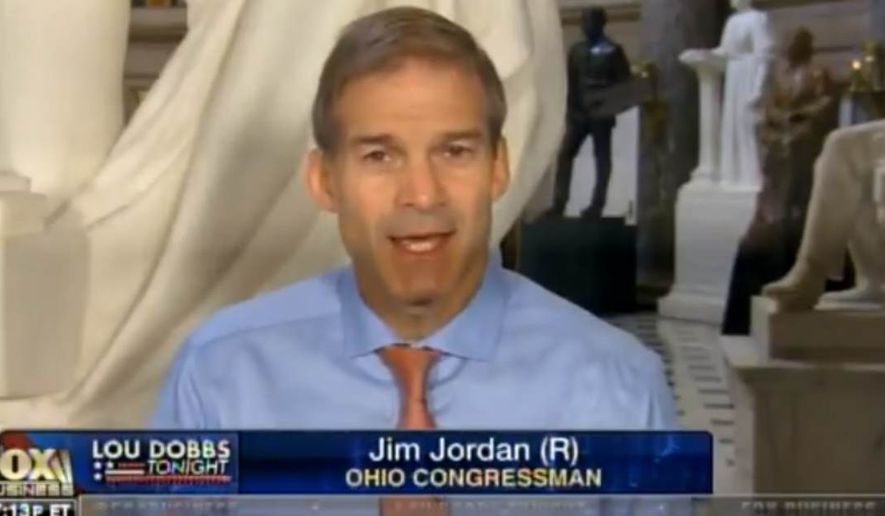House conservatives, increasingly frustrated they’re getting shut out of the spending debate on Capitol Hill, now are reaching for relevance by saying they could withhold their votes unless they begin to see wins for their priorities.
Some leaders of the House Freedom Caucus say they want a fight, now, over funding for President Trump’s border wall. Other conservatives are dialing back expectations, saying one of their hopes is to head off a spending binge in a lame-duck session of Congress.
It remains to be seen whether they’ll have any leverage as Republican and Democratic leaders write the remaining bills needed to keep the government open after the Oct. 1 start of the new fiscal year.
Rep. Jim Jordan said the border wall is the “single biggest promise” the American people remember from the 2016 campaign — and that he wants to dig in to get it done “as soon as possible.”
“I’d prefer we actually do what we said we were going to do now,” said Mr. Jordan, Ohio Republican. “But I made that point a week ago, so it doesn’t look like that’s where leadership wants to go.”
Last week, House and Senate appropriators struck a deal on a massive $850 billion package that would fund the departments of Defense, Labor, Health and Education through next September — and keep the rest of the government running until at least Dec. 7.
That move means the Department of Homeland Security will likely run on current-year funding until at least early December, pushing the fight over border wall money past the November elections.
But Rep. Scott Perry, Pennsylvania Republican, said he’d prefer to have a debate on the wall before November, not during a “lame duck” post-election session of Congress when many members who lost their races could be the deciding votes on various packages.
“It could happen in the lame duck, but my concern is that other poor policy would be attached to that and people that are unaccountable would be voting on that, and I think that’s a realistic concern that not only I have but many Americans have,” said Mr. Perry, another Freedom Caucus member.
Leaders hope to pass nine of the 12 individual spending bills for 2019 before Oct. 1. That would cover about 90 percent of funding for a full year, leaving just 10 percent to run on stopgap money through early December.
That also would defuse the threat of a governmentwide shutdown — if Mr. Trump signs them all into law.
Mr. Trump, however, has signaled interest in a shutdown, and the White House has declined to commit to signing bills beyond an initial package covering energy, water, veterans, military construction and legislative branch programs.
That bill sailed through Congress last week, with even many hard-liners like Mr. Jordan voting yes.
Conservatives say the stakes are higher, though, on the Defense-Labor-Health package.
North Carolina Rep. Mark Walker said many members of the Republican Study Committee, a conservative caucus he chairs, would have a hard time supporting the next round of funding without specific policy wins they can claim.
Mr. Jordan said he doubted anyone in the roughly 40-member Freedom Caucus would vote for the defense-health-labor spending bill, and others are balking at their leadership’s decision to attach Pentagon funding to domestic priorities.
“I don’t agree with the strategy that they have deployed here — you’re doing a Labor-HHS bill actually more indicative of a Democrat majority than a Republican majority,” said North Carolina Rep. Mark Meadows, who chairs the Freedom Caucus.
They object not only to the $180 billion price tag for the labor, health and education departments, but also the lack of policy riders restricting abortion funding or other conservative priorities.
GOP leaders said they agreed to forgo those fights in order to get the spending process on track for the first time in decades.
And they say conservatives should be happy with doling out a $20 billion boost to the Pentagon.
Democratic leaders are facing their own pressures from their left flank. Members of the Congressional Hispanic Caucus wrote to leaders on Friday protesting the funding levels for detention beds and border patrol agents in the homeland security funding bill.
Some conservatives acknowledge the leaders are going to win the fight over ducking a border wall battle before the election — but they want to draw the line on revisiting spending in December.
They say pushing the matter to January would be better because it would avoid pressure to spend big in a lame-duck session.
“I don’t know how we would be disadvantaged by a January” negotiation, Mr. Meadows said. “I don’t see a whole lot of Republican wins in this legislation — let’s put it that way.”
But Rep. Tom Cole, one of the House’s chief spending negotiators, said it would be unfair for lawmakers to try to kick the debate on the outstanding bills to a completely new Congress.
“It’s a bad idea. Why would you do that?” the Oklahoma Republican said. “It’s not the responsibility of the next Congress.”
• David Sherfinski can be reached at dsherfinski@washingtontimes.com.




Please read our comment policy before commenting.